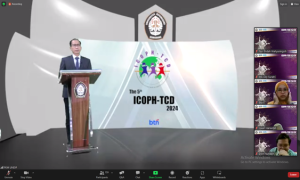Climate change is causing challenges in coastal and tropical environments. Rising sea levels, intensifying storms, coastal erosion and changing rainfall patterns are increasing the vulnerability of these regions to extreme weather events, flooding, and the spread of disease. These climate-induced changes have direct and indirect consequences for human health, making it critical to comprehensively understand, anticipate, and mitigate the associated risks. Health system changes and the development of strategies to strengthen public health resilience are essential in the face of climate change. On July 30-31, 2024, the Faculty of Public Health organized the 5th International Conference of Public Health for Tropical and Coastal Region (ICOPH-TCD) Web Conference entitled “Climate-Sensitive Health Risks on Coastal Living Environment”.
The event began with an opening speech by the Dean of the Faculty of Public Health, Diponegoro University, Dr. Budiyono SKM, M.Kes. In his remarks, the Dean mentioned that climate change refers to significant and long-term changes in the Earth’s climate, including temperature, rainfall, and wind patterns. These changes are largely caused by human activities and impact health risks in coastal environments. The event continued with a welcoming speech by the Rector of Diponegoro University represented by the Head of Reputation Office, Prof. Dr. Hadiyanto, ST, M,Sc. Followed by the keynote speaker presentation from Dr. Anas Ma’ruf is the Director of Environmental Health at the Ministry of Health of the Republic of Indonesia. Dr. Anas said that “Climate change and air pollution significantly affect the coastal living environment in various ways, affecting natural ecosystems and human activities. Scientific evidence, diverse expertise, and global experience, including local, traditional, and customary knowledge, systems, and practices, have significantly improved responses to climate change and health. However, investments in research are needed to support appropriate policy responses with co-benefits for health and the environment”.

The speakers on the first day were Professor Hsiao-Yu Yang (National Taiwan University, Taiwan) and Dr. Bernadette O’Hare (Infection And Global Health, School of Medicine, University Of St. Andrews, United Kingdom). On the second day, the speakers were Professor Elena N. Naumova, Ph.D. (Tufts University, USA), and Professor Dra. R.A. Yayi Suryo Prabandari, M, Si, ph.D (Gadjahmada University, Indonesia), Professor Hanifa Maher Denny, BSPH., MPH, ph.D (Faculty of Public Health, Diponegoro University) and Professor Dr. Juliana Binti Jalaludin (Faculty of Medicine and Health Sciences, Universiti Putra Malaysia, Malaysia). The conference also featured 208 oral presenters from seven countries: Indonesia, the United States,Malaysia, Nigeria, Pakistan, and India. The editors of this proceeding represent five countries, including Prof. Han Jin-Hee (South Korea), Prof. Kun-Hsien Tsai (Taiwan), Prof. Dr. Siti Nursheena (Malaysia), Dr. Siriruk Changrob (United States), Prof. Martha Irene Kartasurya, MD, M.Sc., Ph.D. (Indonesia), Assist. Prof. Naintina Lisnawati, BSPH, M.Nutr (Indonesia), Assist. Prof. Alfi Fairuz Asna, BSc. Nutr, MPH (Indonesia), Assist. Prof. Novia Handayani, BSPH, MA, MPH (Indonesia), and Assist. Prof. Dion Zein Nuridzin, BSPH, MPH (Indonesia). Most of the oral presenters submit and publish their articles to BIO Web of Conferences Proceedings which published in November 2024.

The Faculty of Public Health, Diponegoro University hopes that this activity can provide insight to participants related to public health in general strengthening health systems and developing strategies for community resilience in the face of climate change in particular. In addition, it is also hoped that this activity can open up opportunities for cooperation and collaboration with other institutions both at home and abroad.
